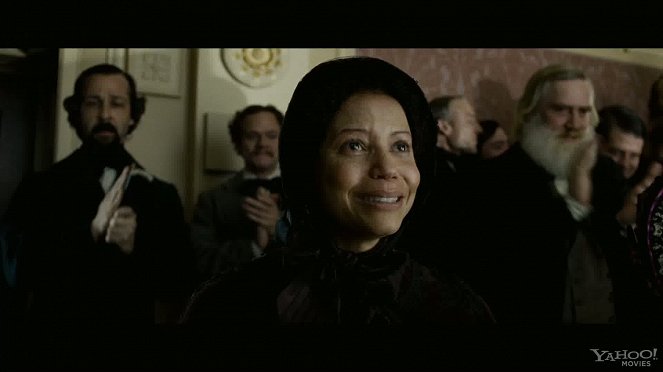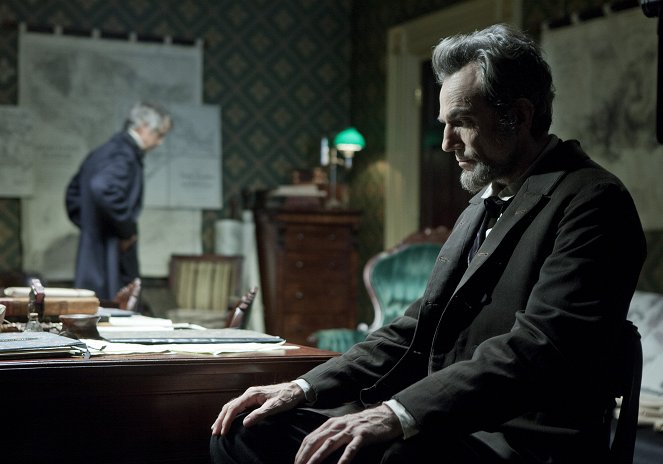Directed by:
Steven SpielbergScreenplay:
Tony KushnerCinematography:
Janusz KaminskiComposer:
John WilliamsCast:
Daniel Day-Lewis, Sally Field, Joseph Gordon-Levitt, Tommy Lee Jones, John Hawkes, Hal Holbrook, James Spader, Tim Blake Nelson, Bruce McGill, Joseph Cross (more)VOD (3)
Plots(1)
A revealing drama that focuses on the 16th President's tumultuous final months in office. In a nation divided by war and the strong winds of change, Lincoln pursues a course of action designed to end the war, unite the country and abolish slavery. With the moral courage and fierce determination to succeed, his choices during this critical moment will change the fate of generations to come. (20th Century Fox UK)
(more)Videos (56)
Reviews (14)
So what, guys, shall we abolish slavery? Yay or Nay? Lincoln watches broodingly. The lawmakers negotiate. Lincoln speaks broodingly. The lawmakers debate. Lincoln remains broodingly silent. The lawmakers argue. Lincoln dictates a letter, broodingly. The lawmakers vote. Lincoln broodingly leaves the room. The lawmakers celebrate. Lincoln dies, this time without a sign of broodiness. I’ll say this, for the target audience of historical conversational biopics (the film shows a battlefield only once, and right at the beginning), this film about the famous American president and the process of approval of the 13th constitutional amendment will probably be perfect. Spielberg is a master of his craft, Daniel Day-Lewis is a master of his art, and both of them show it. But honestly, who among us (with the exception perhaps of art scholars) can be interested in this? In short, a likely bland Oscar winner that I will not like. But I have to give it to it that it never pissed me off the way Spielberg’s previous film did. PS: And I looked forward all the time at least to the assassination… but nothing. PS2: Steven, please, do Robocalypse next.
()
Academy borefest??!! Enslave me, but whoever said this just doesn't have much of a clue as to how far the genius of cinematic storytelling can stretch. Lincoln is a 150-minute long, mostly conversational treasure that, despite the knowledge of the historical outcome, literally engulfs the viewer without a single flinch or flicker of creative indiscretion. A story where there isn't a single scene or line that doesn't fundamentally shift the titular political line or unsentimentally deepen the personal and familial line, which is then logically reflected in the decisions and development of the former. I can't wait to watch it again (and again), to savour more attentively the balanced rhythm with which the lines alternate, overlap and complement each other, the witty interweaving of successive events or the ingenious transitions between scenes, which without exception fit together compositionally and continuously like a full stop at the end of a sentence. Not to mention the brilliant games with lighting and camera positions, the emotions that can only be evoked by the clever handling of editing and narrative direction, and finally the performances of absolutely everyone who appears in front of the camera. Lincoln convinced me of two things: that Abraham Lincoln was one of the greatest figures of the 19th century (even allowing for the undeniable glorification of the film, of course) and that Steven Spielberg is the greatest Hollywood director of all time.
()
In some ways, Lincoln uncomfortably reminded me of last year's sensational The Help. Probably due to the film’s ostentatious clinging to the fact that black and white, truth and falsehood have no shades. Spielberg made a film that reminded me of Eliad's concept of an absolute epic time. It is not a historical drama. It's a myth. A myth in which politicians disintegrate into enlightened progressivists, hysterical obscurantists and spineless "hesitators". A myth in which we do not ask what motivates the main character to such a determined attitude, what drives him forward, because the main character himself is the absolute truth (although it suggests a certain internal ruggedness in the film, the film never lets it prevail and disrupt the state aura). Lincoln could not have wished for a better form than Daniel Day Lewis imprinted on him - slow, deliberate, genial, infinitely kind, yet convinced and convincing to the bone. Spielberg treats the character with striking iconicity - the way he places him in the shots, the way he uses the meaning-creating light, only confirms to us that Lincoln the mortal is not in front of us, but rather Lincoln the icon. When the president dies, Steven draws a baroque shot in which life is darkness and death is light ("He has gone to Eternity"). The Hagiography of the Saint, including the structure of the narrative - an exposition revealing the world in imbalance / enlightenment through dream / rectification / martyrdom (something that has worked well since the Middle Ages, through messianism, to this day). I'm not making fun of it, I’m not questioning it. I've seen other deified lumens with a far greater degree of dilettantism, and it does not bother me in Lincoln. But it also doesn't affect me in any way. This is a film-ritual for believers, whether "Lincoln" or "Spielberg" lovers, who will compete in praising how narratively and formally brilliant it is (and it indeed is). I do not deny the film the visual captivation of classical art, nor the narrative prowess with which Spielberg brings humor to the leather framework of parliamentary debates and skillfully alternates spatial-temporal plans. But the film is cold, simplistic in some respects, avoiding real problems... I have to smile a little: when Lincoln bribes the Democrats to help him out, we can agree that he's doing the right thing (because he represents the truth, "it's a long time ago", and moreover it's filmed as a comedy). But when the protagonist of The Ides of March does the same thing, it's disgusting pragmatism, dirt, disgusting politics, and American critics are writing about a film that today's America doesn't need. Today's America certainly needs Lincoln and a solid granite myth. As a spectator, I don't need to see anything like this, even if it has a more self-virtuoso form. It is, in my view, self-affirming ideological boredom that defends any doubts by eradicating them with the schemes seen a hundred times, to which the elite actors' faces and the proven structure of the narrative give the impression of uniqueness. But such a film is not able to offer me anything important for life, just a yawning abyss of distance from the perfectly coherent and closed world of myth. With all due respect, Mr. Spielberg.
()
(less)
(more)
I had to force myself a little to look at Lincoln at all and I must say that it was worth watching. A myriad of great actors who have something to say... And Spielberg doesn’t make thoroughly bad movies at all and, although long-winded and boring, he makes the process of pushing through the 13th Amendment interesting. Abe (Daniel Day-Lewis is great and the Oscar nomination is more than justified) uses delay, corruption and twisting the truth to get his way. His kind and wonderfully pointed stories make him look like a nice guy, but because of this, the people have to suffer an extra month of war. A stellar moment in history they say... there’s nothing stellar about trying to get your own way and to succeed by scheming and half-truths. I should point out that during the final vote I had my fingers crossed that it would be passed and found myself with a wider and wider smile at each “Yay". Spielberg was successful in not presenting this period in history as being something ultra significant in creating history. He takes it raw, without emotion. And if it works, fine. And if not, at least they tried. Well it is a bit of a disadvantage that we know how it turns out. So it’s hard for the viewer to be fully satisfied. Excursions away from interiors (there are only a couple) where we see the war and what it involved (severed limbs in the wheelbarrow) take up just a couple of minutes of this lengthy movie. This is precisely the style (apart from the fact that the arguments have a head and tail to them) used when the Czech parliament sits (apart from the fact that in the movie someone is really sitting there and nobody is reading the newspaper or sleeping, in fact they actually speak and express their opinion) and I just can’t watch that for more than a few seconds. At least that Williams did the music, otherwise nothing special.
()
I love how different every Steven Spielberg film has been in recent years. How each time he tries a slightly different approach, a different genre, and works with different actors to get it right every time. Like now. For the record, I consider Amistad to be one of Spielberg's best films ever, which made me all the more eager to see how he would deal with slavery this time around. Almost as good (i.e., Amistad is better after all). To make a two and a half hour long film in which there is only talking and dozens of historical characters pass through obviously bothers some people. I don't understand why. A lot of so-called reviewers grumble that the film is a messy, chatty stew that was made just to win an Oscar(s). And most importantly, "there are no battles - even in War Horse there were more". Oh, my God, people! Lincoln is great precisely because there are no battles. We know that the Civil War is raging, we can imagine what a tragedy it is thanks to the opening scene, but why should we continue to watch it? Isn't it enough to watch what it does to people? I think absolutely. The relentless pursuit of the 13th Amendment is a hundred times more thrilling than scenes of a battlefield where cannons tear people apart. And that effort is well described - as is President Lincoln. A sensible and stubbornly opinionated man who has his quirks, his ailments, but also a sense of humor, a perpetual storyteller and (the nicest surprise for me) a thoroughly skilled schemer. The characters, of which there are definitely not as many as many people claim, can be beautifully understood thanks to their performances, the individual stories into which the whole plot is divided are excellent and especially well ended (the last scene of Tommy Lee Jones!). There's not much to say about the actors, Steven Spielberg doesn't pick bad ones... I just wonder why Liam Neeson turned down the role when he's certainly not too old to be the Lincoln we see here. But Daniel Day-Lewis is... Wow! Amazing! So now it's just classic praise for Kaminski's stunning cinematography, which once again plays with light and shadow and looks great in the movie theatre, and of course Williams' music (it doesn't stand out in the film as much as it does on the separate soundtrack, but it's still divine). Five pure stars.
()



Ads